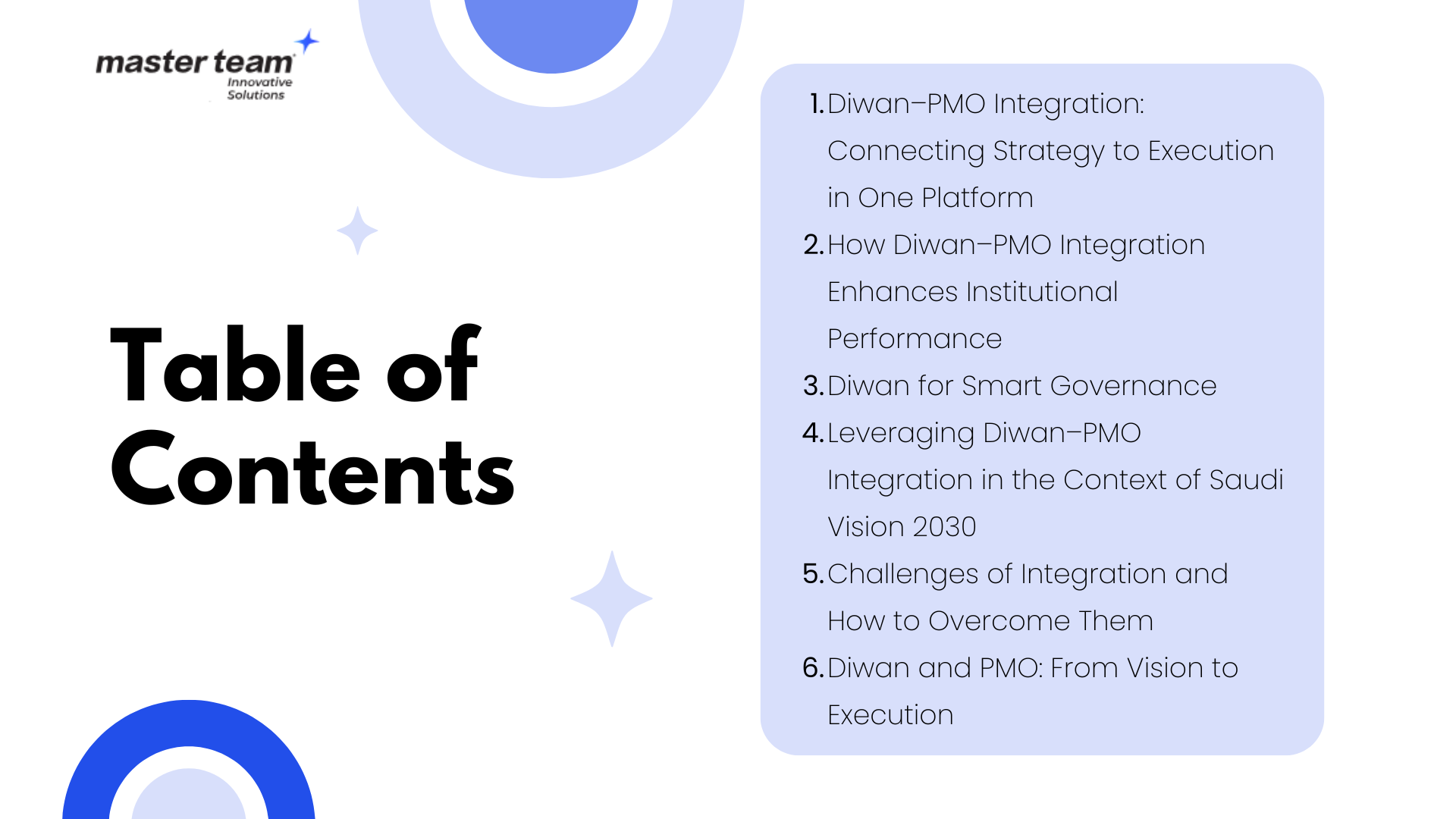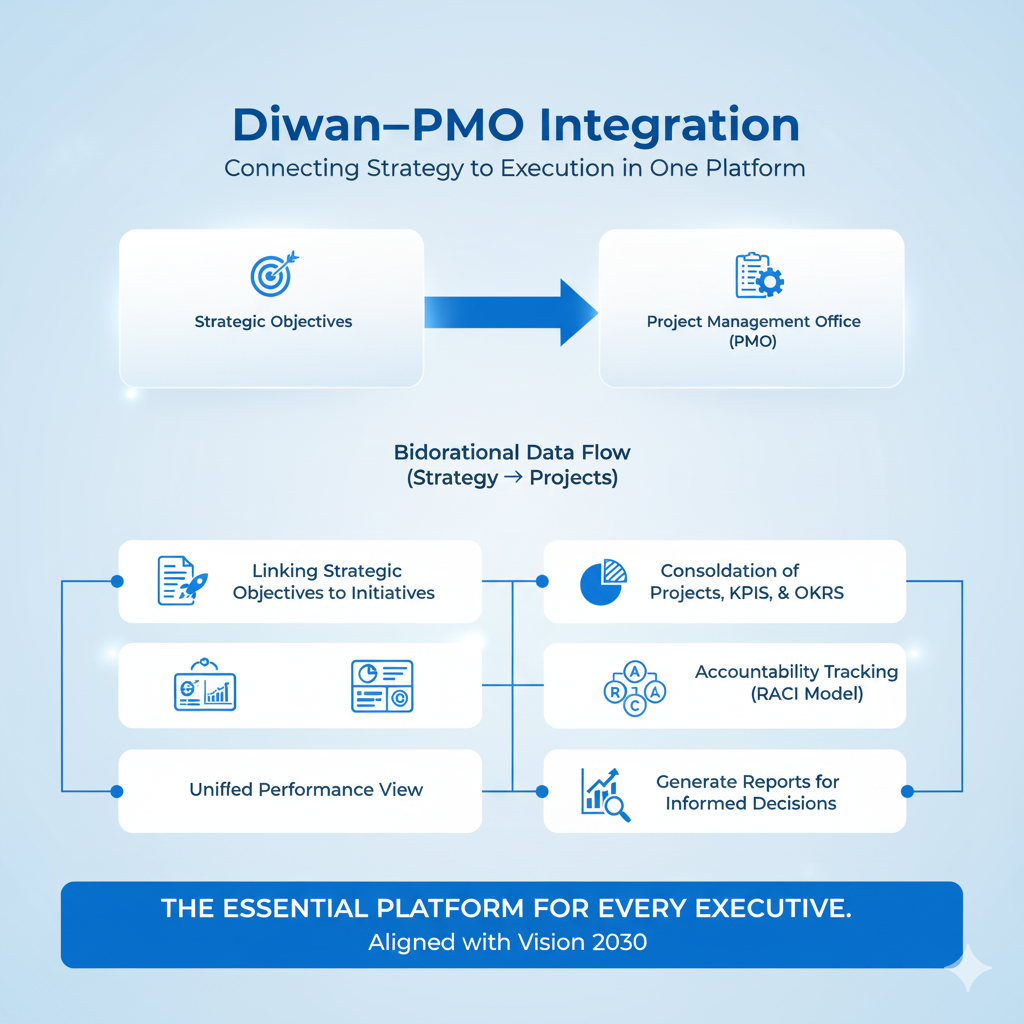
In today’s Saudi business landscape, executive leaders face a recurring challenge: information scattered across multiple systems—from project schedules to meeting minutes, performance reports to initiative tracking. The result? Wasted time searching for data, conflicting priorities, and delayed decisions at a moment when organizations demand speed and precision.
This is where the Diwan Platform steps in as a Centralized Hub for Executives. By integrating strategic planning with the Project Management Office (PMO System), Diwan transforms chaos into clarity. It provides leaders with a Unified Performance View that connects strategic objectives with daily initiatives, turning meetings into decisions and decisions into measurable achievements.
In this article, we’ll explore how Diwan–PMO integration works: from linking objectives with initiatives, to enhancing institutional performance through real‑time dashboards, enabling smart governance and decision‑support reporting, and aligning with Saudi Vision 2030. We’ll also highlight the key challenges and practical solutions to ensure successful integration.
✨ With Diwan platform, your strategy won’t remain on paper—it becomes tangible achievements that strengthen leadership and accelerate decision‑making.
The integration between the Diwan Platform and Project Management Office (PMO) Systems creates a seamless bridge between strategic objectives and execution. Through a Bidirectional Data Flow (Strategy ↔ Projects), key performance indicators (KPIs) and objectives and key results (OKRs) are consolidated into unified dashboards. This enables greater transparency, Real‑Time Strategy Tracking, and stronger coordination across teams.
To understand the practical value of this integration, its core components can be summarized as follows:
In this way, integration goes beyond simply connecting systems—it evolves into a strategic leadership ecosystem. Executives gain the ability to monitor every initiative in real time and ensure that each execution step is directly aligned with the organization’s overarching strategy.

The integration of the Diwan Platform with Project Management Office (PMO) systems strengthens institutional performance by aligning strategic objectives with execution initiatives, providing unified monitoring dashboards, improving cross‑department coordination, and reducing risks through real‑time data that supports decision‑makers.
To understand how this integration translates into practical impact, its key contributions can be summarized as follows:
Through this integration, project management evolves from a fragmented process into a cohesive execution framework. Executives gain the ability to monitor institutional performance in real time, ensuring that every initiative and project directly contributes to the organization’s overarching strategic goals.
The Diwan Platform provides a comprehensive framework for smart governance, combining real‑time dashboards with advanced analytical reports. This empowers leaders to make decisions based on clear, transparent data rather than intuition or fragmented information.
The value of Diwan in governance and reporting is reflected in several key advantages:
With this approach, Diwan goes beyond simple data collection. It becomes a governance engine that strengthens transparency, boosts performance efficiency, and equips decision‑makers with the confidence and clarity to lead their organizations effectively.
The integration of the Diwan Platform with Project Management Office (PMO) systems enables Saudi organizations to achieve the ambitious goals of Vision 2030 by aligning institutional objectives with national priorities, strengthening transparency and governance, and enhancing execution efficiency in line with the requirements of government entities and holding companies.
The role of this integration in supporting Vision 2030 can be highlighted through the following dimensions:
With this integration, Diwan is not just a technical tool it becomes a strategic partner in national transformation. It ensures that every project or initiative within the organization directly contributes to the objectives of Saudi Vision 2030, while reinforcing the institution’s role within the broader development ecosystem.
Despite the significant advantages of integrating the Diwan Platform with Project Management Office (PMO) systems, organizations may encounter a set of technical, organizational, and strategic challenges. These can be addressed through practical solutions that ensure successful and sustainable integration.
The challenges can be grouped into three main categories, each with its corresponding solutions:
By addressing these challenges with clear, actionable plans, the integration of Diwan and PMO evolves from a purely technical project into a strategic enabler. It ensures sustainable institutional performance and empowers organizations to achieve their goals with efficiency, transparency, and confidence.
As we’ve seen, the Diwan Platform connects strategic objectives with initiatives, enhances institutional performance through real‑time dashboards, supports smart governance with actionable reports, and aligns seamlessly with the goals of Saudi Vision 2030. This makes integration with PMO systems no longer a technical option, but a strategic necessity.
🚀 Make Diwan your trusted partner in transforming strategy into tangible results—powered by Master Team’s expertise.
With Master Team’s integrated services:
✨ Together, these solutions create a complete ecosystem for executive leadership—helping you move from vision to execution with confidence, speed, and measurable impact.
Unlike traditional systems that only track project execution, Diwan–PMO integration directly connects projects to strategic objectives. It transforms raw data into real‑time dashboards and intelligent reports that enhance transparency, governance, and decision‑making—capabilities that conventional tools often lack.
Yes. The Diwan Platform is highly flexible and can be tailored to the unique needs of each organization. Whether it’s a ministry, a holding company, or an executive office, Diwan allows full customization of roles, permissions, and dashboards to align with the organizational structure.
AI in Diwan goes far beyond News Sentiment Analysis. It is used to predict risks, analyze performance, support decision‑making, and provide actionable recommendations that improve institutional efficiency and strategic alignment.
S+ platform is a complementary platform that focuses on managing the operational details of projects—such as tasks, schedules, and timelines. It works in full integration with Diwan to cover the execution layer of project management system.
Diwan provides the strategic framework, governance, and alignment of objectives with initiatives, while S+ manages the day‑to‑day operational details of projects. When integrated, organizations gain a comprehensive view—from the strategic level down to execution—ensuring clarity, accountability, and measurable results.